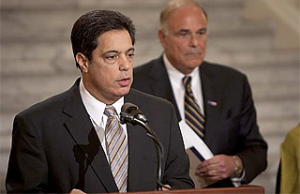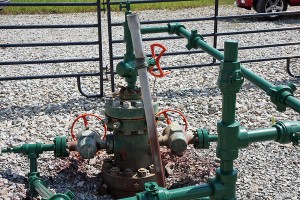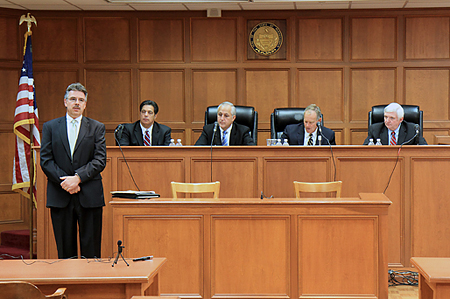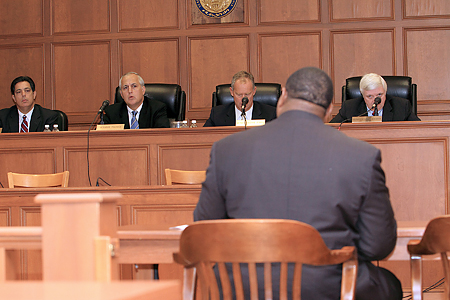HARRISBURG, December 7, 2011 – The Department of Environmental Protection (DEP) has awarded a $350,000 state grant to Wilkins Township, state Sen. Jay Costa and state Rep. Paul Costa announced today.
The township will use the funds to design and construct a storm water collection system to prevent rain runoff from mixing with acid mine water, a problem that impacts several residences in the area of Highland Avenue near the municipal building.
According to the DEP, over a million Pennsylvania homes are built on top of abandoned mines. “Although mine subsidence is the most well-known issue for homeowners in Pennsylvania, acid mine drainage can also cause tremendous damage to a property,” Sen. Costa said.
Drainage flowing from or caused by surface mining, deep mining or coal refuse piles is typically highly acidic with elevated levels of dissolved metals.
“This grant will help Wilkins Township construct a collection system to address the acid mine water problem,” Rep. Costa said. “I’m pleased that the department has approved these much-needed funds for this major project.”
###
Harrisburg, November 23, 2011 – Wrapping up the last of two public hearings on the Legislative Reapportionment Commission’s preliminary plan, testimony given to the commission today was overwhelmingly critical of the plan approved 3-2 along party lines.[audio:https://senatorcosta.com/wp-content/uploads/2011/11/reapportionment-last-hearing-costa-wrap.mp3|titles=reapportionment-last-hearing-costa-wrap]
Senator Jay Costa (D-Allegheny) who is a member of the commission and voted against the preliminary plan issued the following statement:
“I am very proud of the people who traveled on a day where travel is not always convenient as folks prepare for the Thanksgiving holiday. They feel strongly, and I respect their efforts to be heard. The plan was, among other things, described today as ‘a failure in the name of political expediency’ and ‘an abomination’ — assessments with which, in some cases, I have to agree. I can only hope the pleas of those who testified do not fall on deaf ears. I certainly heard the frustration coming through loud and clear.
“Once criticized as ‘the consummate insiders’ game’ redistricting must be pursued in a fair and balanced way, particularly at a time when the public is growing more cynical and distrustful of their public officials.
“As witnessed by repeated testimony at two public hearings held at the Capitol, there are deep concerns about the partisan nature of the preliminary redistricting plan before the commission right now. The ease in which constituents can access their elected leaders has clearly taken a backseat to party interests.
“We will continue to lay out our exceptions to the plan and hope for a more fair, equitable and balanced product as a result.”
The window for public comment expires on November 30, 2011.
###

HARRISBURG, November 15, 2011 – Senate Democratic Leader Jay Costa was joined by former Gov. Ed Rendell at a capitol news conference to draw attention to a recent report that shows Pennsylvania is one of just a few states that made significant progress from 2003 to 2011 in all grades and subjects. [audio:https://senatorcosta.com/wp-content/uploads/2011/11/pa-school-achievement-costa-wrap.mp3|titles=pa-school-achievement-costa-wrap]
The National Assessment of Educational Progress – commonly known as “the nation’s report card” – also shows score gaps between higher- and lower-income students also narrowed from 2003 to 2011 in only four states. Pennsylvania was one of them.
Additionally, more Pittsburgh students scored in the proficient and advanced ranges for reading and math compared to four years ago — until they reached high school, where 11th-grade math scores declined for the second consecutive year. Pittsburgh students also made greater gains than students across Pennsylvania in all grades, except for 11th-grade math.
Costa said the test scores are proof that the targeted investment made by the legislature over the past eight years improved student performance in Pennsylvania and improved public schools.
Costa also expressed concerns that last year’s Republican budget that cut education by nearly $1 billion statewide will reverse these patterns of success and the positive momentum shown in public schools.

HARRISBURG – State Senate Democrats today responded to Governor Tom Corbett’s Marcellus Shale Impact Fee proposal.
State Senate Democratic Leader Jay Costa (D-Allegheny) said he was heartened by the governor’s focus on job creation, but the plan falls short.
“The governor said we must move quickly in order to make sure Pennsylvania creates jobs,” Costa said. “Senate Democrats have been arguing for months that creating jobs for Pennsylvanians must be the number one priority for this fall’s session of the General Assembly. We’ve also been waiting months for an energy policy from the administration. We’d be the first to argue we must move. Let’s do so responsibly.”
“I am very concerned by the way money is being allocated for transportation. As I have said repeatedly in the past, road repairs have been and should remain the responsibility of the drilling companies. Imposing an impact fee shouldn’t relieve them of this responsibility.”
“The utter lack of funds going toward environmental protection is also a concern. This meager amount, layered on budget reductions which have already been imposed on the agency tasked with protecting Pennsylvania while this industry grows at breakneck pace, is severely lacking. We only get one shot at this – and if we don’t protect our water and our land, then we have learned nothing from our history.”
25% of fee revenue would be allocated statewide under the governor’s plan. Of that, the governor seeks to channel only 10.5% of that to the Department of Environmental Protection. Corbett’s proposal would direct the money to the restricted account for plugging of abandoned and orphaned oil and gas legacy wells and administration of enforcement of oil and gas program and other permits related to natural gas development.
“While I respect the governor for finally recognizing that job creation must be our top priority and for bringing job training into the public discussion, we need to be clear on one thing: all Pennsylvanians must benefit .” said Senate Democratic Appropriations Chairman, Vincent Hughes (D-Philadelphia/Montgomery). “That doesn’t happen under the governor’s proposed plan. There was entirely too much focus on the industry, and what the industry needs to create jobs. The governor said today that Pennsylvania is sitting on the second largest energy reserve in the country. The gas companies aren’t going anywhere.”
“We also need to look closely at this plan as it pertains to transportation. We can’t let these multi-million dollar companies forego their obligation to repair the wear-and-tear on roads and infrastructure just because an impact fee has been imposed, and PennDOT is getting some of this money.”
The governor’s impact fee proposal would send 75% of fee revenue to local municipalities where drilling occurs. It is expected to generate $120 million in the first year. If so, Pennsylvania’s Department of Transportation would get $21 million; DEP $3.15million; and counties $32.4 million.
Senate Environmental Resource and Energy Committee Democratic Chairman John Yudichak (D-Luzerne/Monroe/Carbon) warned of the potential unintended consequences of allocating the majority of revenue to counties to distribute to local host and surrounding municipalities.
“The governor’s county-assessed fee approach will create a fragmented patch work of ’have and have-not’ communities across Pennsylvania. It completely overlooks countless communities across Pennsylvania that have road, water system, and other infrastructure demands placed upon them.” said Yudichak.
“We do not apply this type of ‘point of origin’ revenue standard to any other industry whether its gaming, landfills or our corporate tax structure. If the governor truly believes in this industry’s potential to create jobs and revitalize our economy, he must realize we need a strong statewide job’s policy — not a limited county-by-county jobs policy. How can you develop a secondary markets for natural gas in Pennsylvania like power generation and natural gas vehicles if the bulk of the money only goes to those counties that host a Marcellus Shale rig?”
Yudichak added that he was pleased that the governor singled out community colleges and other state-related and state-system universities for their vital role in developing the industry and preparing Pennsylvanian’s workforce.
“I hope when all is said and done, we do indeed see a very active role from these institutions. They took a big hit in this year’s budget, but their importance to our economy is greater than ever. As the natural gas industry grows, they should grow and benefit as well. They have been and will continue to be willing partners.”
“If there’s one thing we must continue to support aggressively, it is education and job-training,” said Hughes. “In the end, it comes down to creating a ready, willing, and able workforce.”
“The well-being of Pennsylvania workers, Pennsylvania unions, and our communities as a whole is what’s important. That is why I am pleased to see the governor putting jobs on the front burner. Now we need to sit down and work together to make sure we reap the economic rewards in a prudent way that protects our natural resources. We want our children and grandchildren to be able to enjoy prosperity in Pennsylvania for years to come.”
Editor’s note:
The Democrats’ job creation plan includes renewed investment in job-producing programs and public works such as water and sewer projects as well as money for new business investments. The plan also provides a new round of capital infusion for the state Machinery and Equipment Loan Fund and would establish Pennsylvania’s version of the successful “Georgia Works” on-the-job training program.
The Pennsylvania Investment Bank would target more than $1.2 billion for water and sewer system reconstruction, new business investment and other public works. The bank would capture funds generated from existing borrowing capacity. The bank would use $500 million in Commonwealth Finance Authority dollars plus a half-billion from PENNVEST (Pennsylvania Infrastructure Investment Authority).
The investment bank would also utilize $80 million in funds from a proposed Marcellus Shale tax or fee along with surplus state revenues. Democrats estimate that these sources would generate $180 million.
Pennsylvania’s unemployment rate spiked by nearly a half percent from July to August – rising to 8.2 percent. Since May, the number of unemployed Pennsylvanians grew by 45,000.




